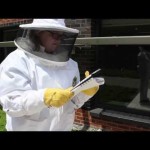WNS Research on WSB-TV
Premiering February 29th, 2016, Biologists predict 95 percent decline in Georgia bats aired on WSB-TV Channel 2 Action News (Atlanta), featuring the work of Georgia State University researchers in their continued work to develop white-nose syndrome (WNS) treatment methods and…
WNS Research on CBS46
Chris Cornelison, a post-doctoral research associate, and Kyle Gabriel, a Ph.D. candidate, were featured on a CBS46 (Atlanta) news piece, Georgia faces one of its worst mosquito seasons, for their research involving the control of white-nose syndrome. Kyle has been…
WNS-Treated Bats Released into Wild
On Tuesday, May 19th, bats that were treated for white-nose syndrome (WNS) were released back into the wild. This past winter’s experimental treatment has been heralded a success by researchers and federal wildlife management agencies. This marks the first time…

The Honeybee Project at GSU
Our antifungal research involving bats, honeybees, banana plants, and grain appears in the Summer 2014 issue of Georgia State University Magazine, along with a beautifully-produced video by Public Relations and Marketing Communications. Download the entire magazine as PDF (article on…

Georgia Tech Urban Honeybee Project
Biology undergraduate Meredith Greene investigates the use of Rhodococcus rhodochrous DAP 96253 to inhibit the growth of a pathogenic fungus that preys on honeybee larvae, with the Urban Honeybee Project at

Air Quality Video Interview on GSTV
Dr. Christopher Cornelison talks to GSTV’s Alex Osiadacz about the indoor air quality research project currently being conducted to study fungal colonization of buildings. Read the GSTV post. Watch the video on YouTube.



